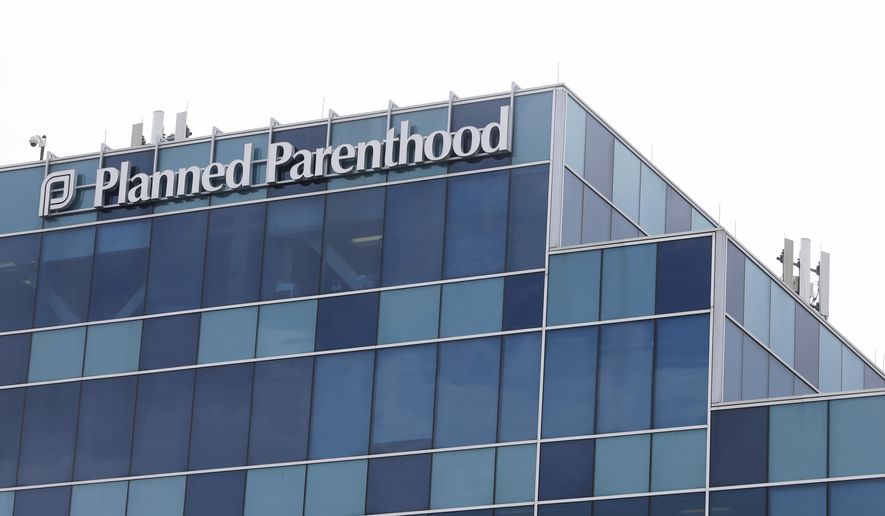Pro-lifers say declining patient numbers, the promotion of abortion at the expense of health care services and the shuttering of several facilities show that Planned Parenthood’s business model is failing and its taxpayer funding could be better spent elsewhere.
The nation’s largest abortion provider announced last week that it would close four clinics in Iowa, three in New Mexico, two in Colorado and its last remaining facility in Wyoming, despite continuing to receive more than $500 million in annual taxpayer funding.
Marjorie Dannenfelser, president of the pro-life Susan B. Anthony List, said Planned Parenthood’s “enterprise is crumbling, even while they are still raking in over half a billion dollars a year from taxpayers.”
“Their abortion-centered business model isn’t just morally wrong, it’s a failure,” Ms. Dannenfelser said in a statement. “In a market where there are so many better options, women don’t need to get their health care from Planned Parenthood.”
After the Casper clinic closes July 21, Wyoming will join North Dakota as the only states without any Planned Parenthood clinics.
The timing of the closures could not be worse for Planned Parenthood, after Republicans maintained majorities in Congress and won the White House in November.
President Trump and Republican congressional leaders have promised to cut off the abortion provider’s taxpayer funding in a health care bill to repeal the Affordable Care Act and to redirect those dollars to clinics that do not perform abortions.
Planned Parenthood officials blamed the Iowa closures on similar legislation at the local level.
“This is a case of extreme Iowa politicians deciding they know what’s better for a woman’s health than the women actually seeking care, with devastating consequences,” Suzanna de Baca, president & CEO of Planned Parenthood of the Heartland, said in a statement.
But Planned Parenthood, which still will have eight facilities in the state, has been hemorrhaging clinics in Iowa for years. According to Iowa Right to Life, Planned Parenthood had 29 locations in the state as recently as 2010.
The closures in other states indicate that Planned Parenthood’s problems are not merely political.
Whitney Phillips, a spokeswoman for Planned Parenthood of the Rocky Mountains, cast the closures in Colorado, New Mexico and Wyoming in purely economic terms.
“This strategic decision will allow us to maintain a fiscally solvent operation that will keep our doors open to patients in the region for the long term,” Ms. Phillips said in a statement.
The financial picture also has been far from rosy in Planned Parenthood’s annual reports.
The number of patients dropped from nearly 3 million in fiscal 2012 to 2.5 million in fiscal 2014, its lowest since 1998.
Planned Parenthood also reported a one-year decline in the performance of health care services, such as testing for sexually transmitted infections, contraception services and cancer screenings, of nearly 11 percent, despite a year-to-year increase in federal funding of more than $25 million.
Abortion numbers, however, remain relatively steady. Planned Parenthood performed 323,999 abortions in fiscal 2014, down 1 percent from 327,653 the previous year.
Planned Parenthood has not released its latest annual report, which is more than five months overdue.
Part of the problem, Ms. Phillips said, is the disruption to the health care market caused by the Affordable Care Act, also known as Obamacare.
“We supported [the ACA] because we love the idea of more people having health insurance and increasing access to the critical services that they need, but a lot of our patients were self-pay,” Ms. Phillips told The Denver Post.
“They would come in and get a Pap smear and pay out of pocket,” she said. “Under the ACA, a lot of patients were given the opportunity to be on Medicaid. Again, that’s wonderful, but it meant that rather than bill them directly, we had to bill Medicaid. And Medicaid reimburses at a very low rate.”
Ms. de Baca, CEO of Planned Parenthood of the Heartland, said defunding Planned Parenthood will “set a health care crisis in motion.”
“Anti-choice politicians — who are driven by their personal beliefs, not facts — are hurting women by preventing us from being able to provide critical family planning services and lifesaving cancer screenings,” she said.
But pro-lifers point out that Planned Parenthood represents less than 1 percent of the market for breast cancer screenings and other health care services but performs more than one-third of all abortions in the U.S.
Furthermore, federally qualified health care clinics outnumber Planned Parenthoods by at least 20-to-1, according to the pro-life Charlotte Lozier Institute.
Iowans for Life Director Maggie DeWitte said there are “many quality community health centers in Iowa that provide comprehensive health care to women and families across the state” without “taking the life of precious human beings.”
“This is a victory for our state, and IFL is committed to continue working to see all abortion clinics closed in Iowa,” Ms. DeWitte said in a statement.
Even Adrienne Mansanares, an official with Planned Parenthood of the Rocky Mountains, said the decision to shut down the organization’s last facility in Wyoming was motivated by the availability of other clinics in the area.
“Our No. 1 priority and concern is to ensure that we have coordination of care for our patients,” Ms. Mansanares told the Casper Star Tribune. “We’ll be working really closely with our patients to make sure we get them connected to another provider.”
• Bradford Richardson can be reached at brichardson@washingtontimes.com.




Please read our comment policy before commenting.